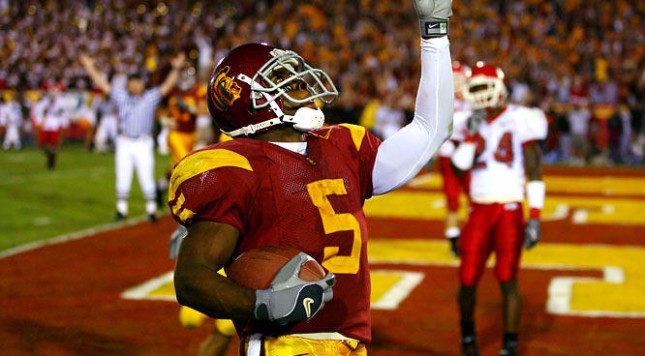The NCAA and USC are still at it in the courts, but where was the press when this story acquired critical mass? That’s what a guest columnist wants to know about.
*
Josh Webb is one of the 10 unsung #CollegeSportsTwitter stars you were encouraged to follow for 2016. You can find him here for commentary on USC, the welfare of student-athletes, remarks on pop culture, and a lot more.
I’ve been asking the members of the “unsung College Sports Twitter stars” list to answer two questions. One concerns the biggest myth in college sports. The other is the one Josh tackles here:
*
What is the most underreported story in college sports over the past 25 years?
Josh Webb answers below:
This is going to sound totally homer, but it is the NCAA’s unfair treatment of USC.
Had the national media paid attention back then instead of brushing off USC fans as conspiracy theorists, they might have stopped the NCAA before the organization got away with half the crap it did. It’s easy to understand why most journalists jumped right on the “USC deserves to be punished” bandwagon at the time. Hindsight is 20/20, and the cultural climate for reform had not yet boiled over.
That said, a lot of good journalists were crying foul by the NCAA back then, and the national media ran with their stories anyhow. If USC had been given the same media treatment Oklahoma State got when Sports Illustrated tried to tank the school with shoddy reporting, then several very corrupt NCAA officials might have been discovered. It seems pretty clear to most that Reggie Bush and his family received benefits of some kind, but the question was always “Did USC know?” Nobody really seemed interested in answering that with any sort of integrity.
It is possible to conclude that Bush’s family had been given benefits, but that the school was not aware of anything, and that the person claiming it was aware had little to no evidence to support his claim. That drastically changes how the school is punished and perceived.
As it stands, many of these same outlets are now having to print stories on the NCAA’s malicious prosecution and lack of evidence. Had anyone bothered to put the pieces of this story together without trying to sensationalize the evidence, logic would have led them down the same path the courts took when they hammered the NCAA for their approach.
The Todd McNair case is tangible proof that the NCAA is a very flawed organization, comprised of easily manipulated human beings with monetary interests coming before the interests of the athletes they are there to protect. Chasing the actual evidence in this case back then would have put a spotlight on these actions and helped to prevent the drastic overreach the NCAA used as a weapon for so many years. As it stands, McNair is a significant reason the NCAA is in so much hot water.

